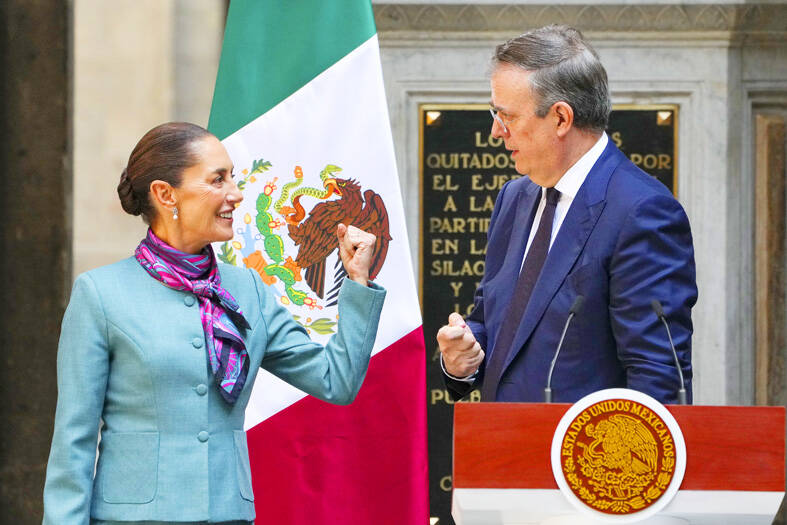Mexico is planning to carry out a “cleaning” operation across the country to combat the flow of illegal merchandise entering the country mainly from China, the Mexican Ministry of Economic Affairs said.
The ministry would lead searches across all 32 Mexican states, including ports and airports, Mexican Minister of Economic Affairs Marcelo Ebrard said on Friday.
The move follows a raid on Thursday in which about 200 officials searched a shopping square in Mexico City known for selling Chinese goods. The government seized more than 260,000 items with an estimated value of 7.5 million pesos (US$368,089).

Photo: AP
“The searches will help determine the size of these illegal flows of goods entering the country,” said Luis Enrique Vazquez, technical secretary for the ministry’s foreign trade office.
“They will enable us to trace and quantify the volumes we are dealing with, that seem to be huge,” he added.
Vazquez declined to disclose when and where the next searches would be done, citing security reasons.
The US and Canada have voiced concerns that Mexico’s trade practices with China are not aligned with its North American allies. There has also been growing investor jitters after US president-elect Donald Trump last week announced his intention to impose tariffs on its neighbors, in an effort to pressure them to curb the flow of migrants and the entry of illegal drugs such as fentanyl.
Asked by reporters whether the move was a signal to Trump, Ebrard joked that he had not received a call from the US president-elect about the specific Mexico City mall that was raided.
Mexican authorities on Thursday’s search found an array of products, from screws to coffee machines, to toys and textiles. The objects for sale included items from Bangladesh, China, Malaysia, Vietnam and Indonesia.
Local chambers of commerce have also accused Chinese e-commerce platforms of bending rules to avoid taxes on their packages.
The Mexican Ministry of Economic Affairs is working with the country’s Ministry of Finance and tax body on a mechanism to ensure these platforms pay taxes, Vazquez said.
Mexico’s tax agency last month in a statement announced measures to increase control and monitoring of merchandise entering the country. Ensuring platforms pay taxes is the next step, Vazquez said.
The measures have been in the works for months, he said, as he denied that they were in response to pressure from the US, he said
“You can’t plan such operations in a matter of days over one remark. We’ve been planning this for months,” he said, adding that the move aims to guarantee better conditions for Mexico’s local industries.

CHAOS: Iranians took to the streets playing celebratory music after reports of Khamenei’s death on Saturday, while mourners also gathered in Tehran yesterday Iranian Supreme Leader Ayatollah Ali Khamenei was killed in a major attack on Iran launched by Israel and the US, throwing the future of the Islamic republic into doubt and raising the risk of regional instability. Iranian state television and the state-run IRNA news agency announced the 86-year-old’s death early yesterday. US President Donald Trump said it gave Iranians their “greatest chance” to “take back” their country. The announcements came after a joint US and Israeli aerial bombardment that targeted Iranian military and governmental sites. Trump said the “heavy and pinpoint bombing” would continue through the week or as long

TRUST: The KMT said it respected the US’ timing and considerations, and hoped it would continue to honor its commitments to helping Taiwan bolster its defenses and deterrence US President Donald Trump is delaying a multibillion-dollar arms sale to Taiwan to ensure his visit to Beijing is successful, a New York Times report said. The weapons sales package has stalled in the US Department of State, the report said, citing US officials it did not identify. The White House has told agencies not to push forward ahead of Trump’s meeting with Chinese President Xi Jinping (習近平), it said. The two last month held a phone call to discuss trade and geopolitical flashpoints ahead of the summit. Xi raised the Taiwan issue and urged the US to handle arms sales to

BIG SPENDERS: Foreign investors bought the most Taiwan equities since 2005, signaling confidence that an AI boom would continue to benefit chipmakers Taiwan Semiconductor Manufacturing Co’s (TSMC, 台積電) market capitalization swelled to US$2 trillion for the first time following a 4.25 percent rally in its American depositary receipts (ADR) overnight, putting the world’s biggest contract chipmaker sixth on the list of the world’s biggest companies by market capitalization, just behind Amazon.com Inc. The site CompaniesMarketcap.com ranked TSMC ahead of Saudi Aramco and Meta Platforms Inc. The Taiwanese company’s ADRs on Tuesday surged to US$385.75 on the New York Stock Exchange, as strong demand for artificial intelligence (AI) applications led to chip supply constraints and boost revenue growth to record-breaking levels. Each TSMC ADR represents

State-run CPC Corp, Taiwan (CPC, 台灣中油) yesterday said that it had confirmed on Saturday night with its liquefied natural gas (LNG) and crude oil suppliers that shipments are proceeding as scheduled and that domestic supplies remain unaffected. The CPC yesterday announced the gasoline and diesel prices will rise by NT$0.2 and NT$0.4 per liter, respectively, starting Monday, citing Middle East tensions and blizzards in the eastern United States. CPC also iterated it has been reducing the proportion of crude oil imports from the Middle East and diversifying its supply sources in the past few years in response to geopolitical risks, expanding